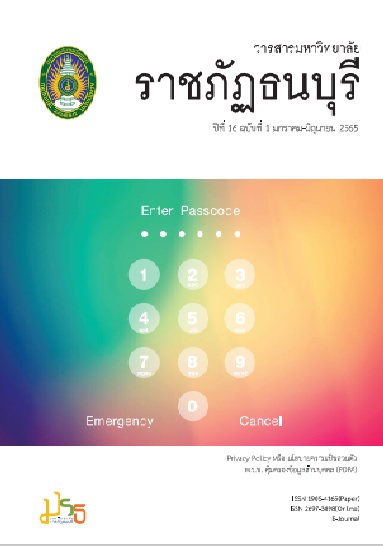A Curriculum Evaluation of Doctor of Philosophy in uddhist Psychology, Revised Edition 2017, Mahachulalongkornrajavidyalaya University
Abstract
The objectives of this study were 1) to evaluate the Doctor of Philosophy curriculum in Buddhist Psychology, revised edition 2017, and 2) to study the guidelines for curriculum development and improvement by using the CIPP evaluation model of Danial L. Stuffle Beam. This quantitative research focused on 4 dimensions: context, input, process, and product. Data were collected by examining curriculum documents, inquiring and interviewing the opinions of those related to the use of the curriculum from 4 target groups: 20 experts, 5 full-time instructors, 18 graduate users, and 69 students. The results revealed that the overall curriculum evaluation was high. When considering each aspect, it was found that the average score of the context was 0.75 – 0.95; the input evaluation was at a high level. Also, the overall process evaluation in the context, learning and teaching processes, and curriculum administration process was at the highest level. Moreover, when each item was considered, the overall evaluation of instructor administration, development, and learning support was high. In addition, the overall productivity evaluation was at the highest level, and the average score of the overall students’ opinions was high. The analysis results of curriculum structure (1.1 and 2.1), courses in general, and courses in each aspect were at the highest level.
Downloads
References
กมล โพธิเย็น. (2559). การประเมินหลักสูตรศิลปศาสตรบัณฑิต สาขาวิชาจิตวิทยา. คณะศึกษาศาสตร์ มหาวิทยาลัยศิลปากร.
กิ่งฟ้า สินธุวงษ์ (2552). การประเมินเพื่อการเรียนรู้, วารสารวิชาการ มหาวิทยาลัยราชภัฎบุรีรัมย์. 1 (1), น. 6-19.
กองกิจการนิสิต สำนักงานอธิการบดีมหาวิทยาลัยมหาจุฬาลงกรณราชวิทยาลัย. (2560). นวลักษณ์นิสิต 9. ค้นเมื่อวันที่ 13 ตุลาคม 2564 จาก https://stud.mcu.ac.th/?page_id=1215.
จรรยา ดาสา และคณะ. (2563). รายงานวิจัยเรื่อง การประเมินและติดตามผลหลักสูตรการศึกษามหาบัณฑิต สาขาวิทยาศาสตรศึกษา (แผน ข) มหาวิทยาลัยศรีนครินทรวิโรฒ. ศูนย์วิทยาศาสตรศึกษา มหาวิทยาลัยศรีนครินทรวิโรฒ.
จิรัญญา บุรีมาศ และชนาธิป สันติวงษ์. (2561). การประเมินหลักสูตรสาธารณสุขบัณฑิต พ.ศ. 2553 คณะสาธารณสุขศาสตร์ มหาวิทยาลัยราชภัฎนครราชสีมา สาขาวิชาสาธารณสุขศาสตร์ คณะวิทยาศาสตร์และเทคโนโลยี. นครราชสีมา : คณะวิทยาศาสตร์และเทคโนโลยี มหาวิทยาลัยราชภัฏนครราชสีมา.
พุทธชาติ แผนสมบุญ และคณะ. (2563). รายงานผลการประเมินโครงการสานงานเสริมพลังภาคีเครือข่ายสุขภาวะระดับกลุ่มจังหวัด. สำนักพัฒนาภาคีสัมพันธ์และวิเทศสัมพันธ์ (สภส.) สำนักงานกองทุนสนับสนุนการสร้างเสริมสุขภาพ (สสส).
มั่น เสือสูงเนิน สิริวัฒน์ ศรีเครือดง และเมธาพันธ์ โพธิธีรโรจน์. (2562). การประยุกต์หลักพระพุทธศาสนาเพื่อการจัดการศึกษาทางด้านจิตวิทยาของมหาวิทยาลัยมหาจุฬาลงกรณราชวิทยาลัย. วารสาร มจร สังคมปริทรรศน์. 8 (1), น. 112.
วัชระ จันทราช. (2554). การประเมินหลักสูตรศึกษาศาสตร สาขาวิชาภาษาอังกฤษ. วารสารศิลปากรศึกษาศาสตร์วิจัย. 3(1), น.71-72.
วิชัย วงษ์ใหญ่. (2554). การพัฒนาหลักสูตรระดับอุดมศึกษา. กรุงเทพมหานคร : อาร์ แอนด์ ปริ้น จำกัด.
สุชาติ พิมพ์พันธ์ และคณะ. (2559). การประเมินหลักสูตรครุศาสตรบัณฑิต สาขาวิชาพุทธศาสนศึกษา พ.ศ. 2555. คณะครุศาสตร์ : มหาวิทยาลัยราชภัฎนครราชสีมา.
สำนักประกันคุณภาพ. (2562). คู่มือการประกันคุณภาพการศึกษาภายใน 2562. กรุงเทพมหานคร : มหาวิทยาลัยมหาจุฬาลงกรณราชวิทยาลัย.
Oliva. P. F. (2009). Developing the curriculum (7th ed.). Boston: Allyn and Bacon.
Ornstein. A. G. & Hunkins. F. P. (2013). Curriculum foundations, principles, and issues. New York: Pearson Education.
Patphol. M. (2015). Curriculum evaluation for learning and development (3rd eds.) Bangkok: Charansanitwong Printing Co., Ltd.
Stuffle Beam. D. L. (1973). “Education evaluation and decision-making”. In Education evaluation: Theory and practice. Belmont, California: Wadsworth Publishing Company.
Wongyai. W. (2011). Curriculum Evaluation for Higher Education.Bangkok: R&N Printing Co., Ltd.
Downloads
Published
How to Cite
Issue
Section
License

This work is licensed under a Creative Commons Attribution-NonCommercial-NoDerivatives 4.0 International License.
บทความที่ได้รับการตีพิมพ์เป็นลิขสิทธิ์ของ มหาวิทยาลัยราชภัฏธนบุรี
ข้อความที่ปรากฏในบทความแต่ละเรื่องในวารสารวิชาการเล่มนี้เป็นความคิดเห็นส่วนตัวของผู้เขียนแต่ละท่านไม่เกี่ยวข้องกับมหาวิทยาลัยราชภัฏธนบุรีและบุคลากรท่านอื่นๆในมหาวิทยาลัยฯ แต่อย่างใด ความรับผิดชอบองค์ประกอบทั้งหมดของบทความแต่ละเรื่องเป็นของผู้เขียนแต่ละท่าน หากมีความผิดพลาดใดๆ ผู้เขียนแต่ละท่านจะรับผิดชอบบทความของตนเองแต่ผู้เดียว







